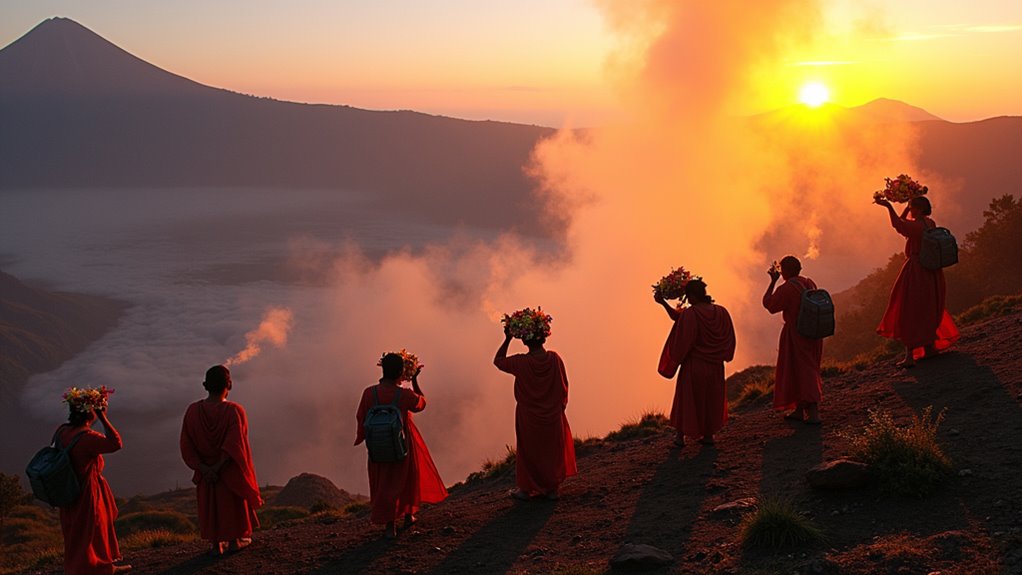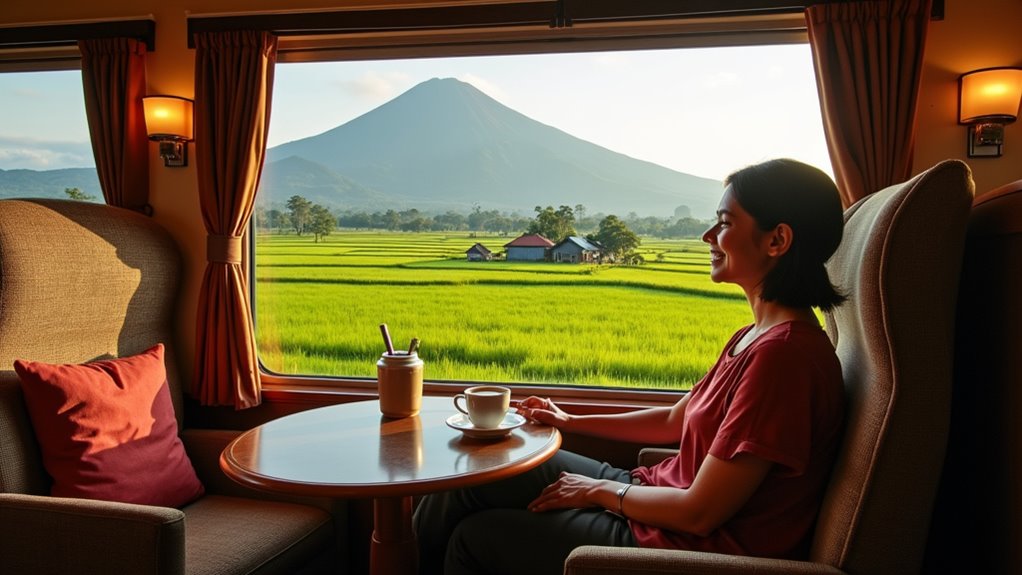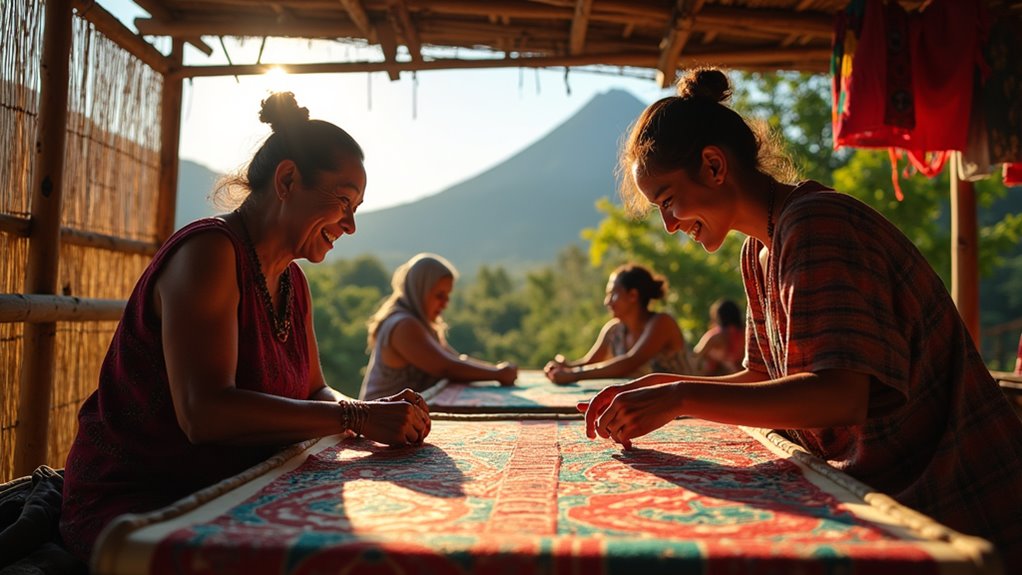Physical Address
304 North Cardinal St.
Dorchester Center, MA 02124
Physical Address
304 North Cardinal St.
Dorchester Center, MA 02124

Java holds treasures beyond Bali's beaches, offering spectacular volcanoes, ancient temples, and authentic culture at unbeatable prices.
While Bali attracts over 6 million international travelers annually, neighboring Java—Indonesia’s most populous island—remains surprisingly underexplored. You’ll find this cultural powerhouse offers extraordinary value for travelers seeking authentic experiences without the crowds. From ancient temple complexes to active volcanoes, vibrant arts scenes to culinary delights, Java delivers unforgettable adventures at a fraction of what you’d pay elsewhere in Southeast Asia. The island’s seven standout features make it impossible to ignore when planning your next Indonesian journey.

When you step onto Java’s ancient soil, you’re immediately connected to centuries of Indonesian history through its spectacular temple ruins and royal palaces. The UNESCO-listed Borobudur stands as one of the world’s largest Buddhist temples, while nearby Prambanan showcases elaborate Hindu carvings.
Don’t miss Yogyakarta Palace (Kraton), a rich display of architectural and historic significance with guided tours that provide deeper insights into royal heritage. Here, you’ll catch traditional gamelan music and dance performances that bring Javanese folklore to life.
The Sultan’s palace enchants visitors with living heritage, where royal traditions and mesmerizing performances reveal Java’s cultural soul.
For a more secluded experience, explore Ratu Boko Temple or Taman Sari Water Castle.
Java’s hundreds of ancient stone “candi” monuments offer insights into early classical period architecture and religious practices. Each site tells a unique story of the island’s Hindu-Buddhist kingdoms and their architectural achievements. Unlike the beachy atmosphere of Sanur’s coastline, Java’s historical sites transport you to a world of emperors, ancient religions, and architectural marvels.
Java’s volcanic skyline might be the most spectacular natural wonder you’ll ever witness. The island offers accessible adventure with iconic Mount Bromo‘s billowing crater and surrounding “Sea of Sand” just 250 steps from vehicle drop-offs.
For more adventure, trek to Mount Ijen‘s electric blue crater lake and witness rare blue flames on a night hike. Mount Merapi offers guided summit hikes, while Mount Semeru rewards multi-day trekkers with Java’s highest peak (3,676m). Similar to Bali, Java provides numerous adrenaline-pumping activities throughout its volcanic terrain that attract thrill-seekers from around the world.
These volcanoes aren’t just geological marvels—they’re cultural touchstones. The indigenous Tenggerese perform annual offerings at Bromo’s crater, while Ijen’s sulfur miners haul 70-90kg loads daily. Many visitors also enjoy the breathtaking panoramic views at Tangkuban Perahu crater that overlook the surrounding city landscape.
Both accessible viewpoints and challenging treks await, with licensed guides providing necessary equipment like gas masks for safe exploration.

To truly understand Java’s soul, learn about its vibrant cultural scene where ancient traditions blend with modern celebrations. Witness the hypnotic Kuda Lumping trance dancers or the strength-testing Reog Ponorogo performers with their massive lion-peacock headgear weighing up to 50kg.
Java beckons with mystical trance dancers and warriors carrying impossible burdens, where tradition and innovation dance together.
Time your visit for Nyepi’s colorful Ogoh-Ogoh monster parades or the week-long Sekaten festival with its gamelan performances and night markets. Don’t miss the Yadnya Kasada ceremony, where Tenggerese Hindus make dramatic offerings into Mount Bromo’s crater. For a truly spiritual experience, join the annual Vesak Day celebrations at the magnificent Borobudur temple in Central Java.
For hands-on experiences, join batik workshops in Yogyakarta or watch silver filigree artisans in Kotagede craft jewelry using 16th-century techniques. Many travelers find that Java offers a more authentic culture than Ubud’s tourist spots, while still maintaining its traditional charm.
The International Mask Festival and Jember Fashion Carnival showcase Java’s perfect balance of reverence for tradition and contemporary creative expression.
Food adventurers will discover that Java’s culinary landscape offers an unmatched feast for the senses, featuring dishes you simply won’t encounter elsewhere. Each region boasts distinctive specialties worth seeking out.
In Central Java, try nasi liwet (coconut-infused rice with chicken) and gudeg (young jackfruit stew). West Java delivers spicy seblak and batagor (fried tofu with fish balls), while East Java‘s rawon (black beef soup) and soto ayam Ambengan provide opulent, complex flavors. When you visit the southern regions, don’t forget to stop by the best breakfast spots in areas like Uluwatu for a taste of local morning delicacies.
Don’t miss Semarang’s unique spring rolls or Yogyakarta’s sate klathak (goat satay). West Java’s Tutug Oncom Rice offers a savory combination of fermented soybean cake mixed with rice, typically served with fried chicken or salted fish.
Historical influences appear in Dutch-inspired poffertjes and Chinese-influenced siomay dumplings.
Even budget travelers can enjoy these authentic tastes at local warungs, where you’ll pay a fraction of tourist restaurant prices.

While many Southeast Asian destinations struggle with transportation challenges, Java distinguishes itself for its remarkably developed infrastructure that won’t drain your travel budget. Jakarta’s expanding MRT and LRT systems transport millions efficiently, with daily ridership exceeding expectations.
You’ll appreciate the cost-effective options throughout the island. The extensive BRT network serves over a million riders daily at minimal cost. Indonesia’s projected air passenger volume of nearly 89 million by 2025 reflects the country’s robust aviation infrastructure.
For last-mile connectivity, digitalized motorcycle taxis from Gojek or Grab offer affordable rates, often with first-time user discounts. When comparing with other popular destinations, you’ll find Java offers better value than Bali for similar travel experiences.
Intercity travel is equally accessible through budget airlines, affordable train routes connecting major cities, and modern toll roads.
Government fuel subsidies keep costs lower than regional averages, while tourist-friendly innovations like the JakLINGKO card integrate payments across multiple transport modes at reduced rates.
Beyond Java’s excellent infrastructure lies its remarkable commitment to environmental preservation through innovative eco-tourism initiatives. The “Wonderful Indonesia Ecotourism Initiative,” launched in 2024, has improved accessibility to natural sites while supporting community-led conservation programs. Unlike Bali’s famous black sand beaches, Java offers diverse ecological experiences that showcase its unique volcanic landscape.
You’ll find private companies like Bromo Eco Tourism and Altaï Indonesia offering low-carbon adventures that contribute to conservation efforts. The recent UN Tourism CAP-CSA Joint Meeting highlighted Indonesia’s leadership in sustainable tourism development, particularly in Java. These operators partner with local communities, ensuring your tourism dollars directly benefit villagers through eco-guiding, handicraft production, and homestay programs.

Javanese communities offer travelers unparalleled opportunities for authentic cultural exchanges that go far beyond typical tourist experiences. You can learn about rural homestays at Ngadas Village, where families welcome you into multi-generational households while sharing agricultural traditions and local cuisines.
Experience Java through authentic homestays where families share generations of tradition beyond tourist facades.
For deeper cultural understanding, join interfaith dialogue programs with santri students at Islamic boarding schools or participate in discussions with religious leaders exploring Indonesia’s pluralistic society.
Creative travelers should seek traditional arts mentorship through batik workshops with Yogyakarta experts or gamelan music collaborations. The island’s rich heritage is evident through ancient temples like Borobudur and Prambanan, which provide historical context to these artistic traditions.
Budget-conscious visitors can connect through volunteer initiatives like Dejavato Foundation’s community programs or join student-led social innovation projects at universities in Malang and Yogyakarta, where you’ll work alongside locals addressing environmental and urban development challenges. Culinary enthusiasts can explore local markets and participate in cooking classes to learn about Balinese flavors that have influenced Javanese cuisine.
Java isn’t just worth visiting—it’s a must-see destination that won’t break your bank. You’ll get incredible value exploring ancient temples, dramatic volcanoes, and vibrant markets. A friend of mine spent just $30 a day enjoying luxurious hotels and authentic street food in Yogyakarta. Pack your bags and experience Java’s magic yourself—it delivers unforgettable adventures at prices that make other tropical destinations seem overpriced.